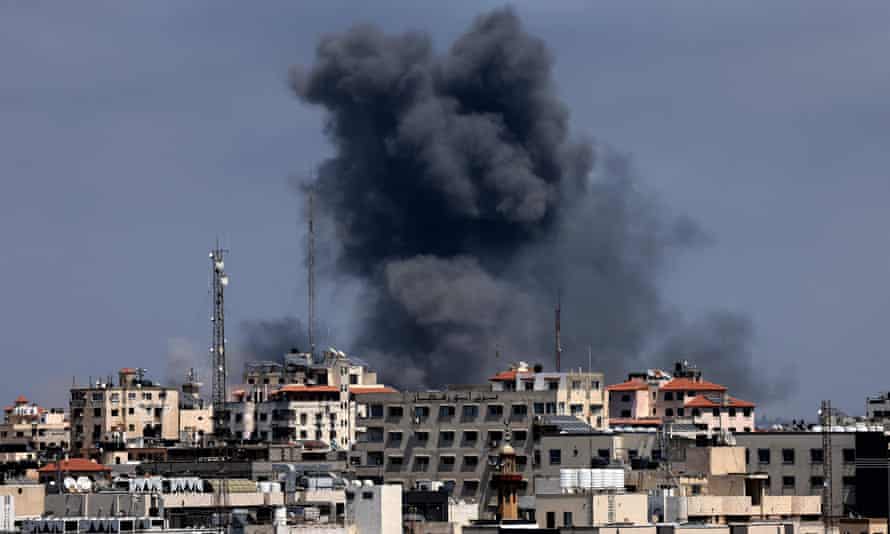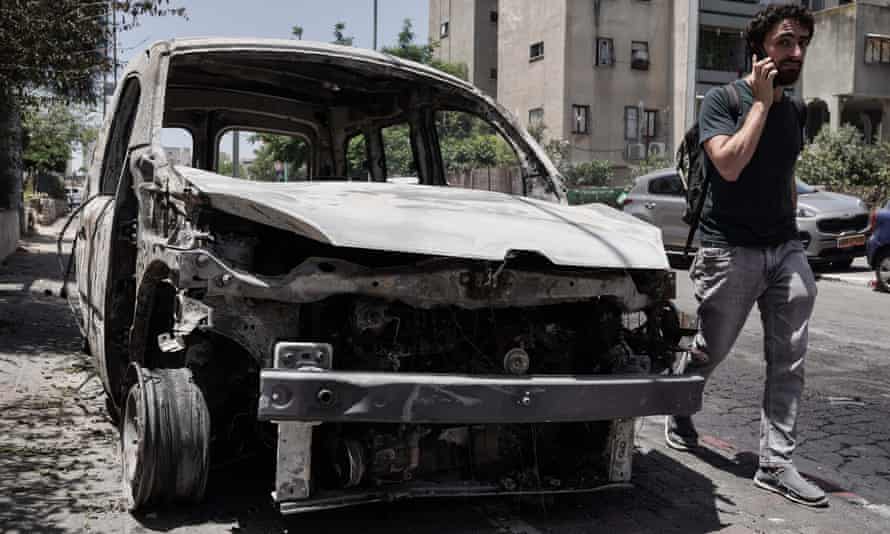Defence minister rules out ceasefire as Israeli military says it has killed four senior Hamas commanders

Israel will not stop its military operation in Gaza until “complete quiet” has been achieved, the country’s defence minister has said, as airstrikes and rocket fire continued throughout Wednesday.
As the death toll from the most serious conflict between Israel and the Palestinians for nine years mounted, international leaders called for restraint amid fears of a full-scale war. At the same time of the exchange of bombs and rockets between Israel and Gaza, there has been an upsurge in ethnically motivated attacks in mixed neighbourhoods inside Israel by both Jewish and Arab mobs.
Joe Biden spoke to the Israeli prime minister Benjamin Netanyahu saying: “My expectation and hope is that this will be closing down sooner than later”, but he added Israel had the right to defend itself against incoming rockets. Russia called for an urgent meeting of the “quartet” of mediating powers: the US, Russia, UN and the EU, a call supported by the UN secretary general, António Guterres.
Israeli airstrike collapses tower block and Hamas rocket hits bus as violence escalates – video
Gaza’s death toll has risen to 65, including 16 children, according to the health ministry. More than 300 people have been wounded. Six Israeli civilians, including two children – one of them a six-year-old – have been killed by rocket fire and dozens wounded.
Towns in Israel with mixed Jewish and Arab populations have also experienced violent clashes. In Bat Yam, a Tel Aviv suburb, a crowd of Jewish ultra-nationalists attacked a car they believe was being driven by an Arab, dragging the driver out of the car and beating him. The victim was hospitalised with serious injuries.
In Lod, a town south of Tel Aviv, the mayor warned of “civil war” and called for the Israeli military to restore calm. Police units were redeployed from the West Bank to Lod as people threw rocks and set fire to cars and buildings, including synagogues. In Acre to the north, an Arab mob attacked and critically injured a Jewish man, and attacked the ambulance talking him to hospital.
Tor Wennesland, the UN’s Middle East envoy, said leaders on all sides must “take the responsibility of de-escalation”.
Before briefing the 15 members of the UN security council on the crisis on Wednesday – its second such meeting in three days – Wennesland warned: “The cost of war in Gaza is devastating and is being paid by ordinary people. Stop the fire immediately. We’re escalating towards a full-scale war.”
A White House account of the Wednesday’s phone call between Biden and Netanyahu said that the US president had “conveyed his unwavering support for Israel’s security and for Israel’s legitimate right to defend itself and its people, while protecting civilians.”
“He also conveyed the United States’ encouragement of a pathway toward restoring a sustainable calm,” a White House statement said.
But the US blocked a unified security council statement on the situation, arguing it would be unhelpful while contacts with leaders in the region were continuing. The secretary of state, Tony Blinken, said that Hady Amr, the deputy assistant secretary of state for Israel and Palestinian affairs, would travel to the region immediately to meet Israeli and Palestinian leaders. The White House said it would nominate a candidate for the empty post of US ambassador to Israel in the next few weeks.
In the UK, Boris Johnson urged Israeli and Palestinian leaders to “step back from the brink”. Calling for both sides to show restraint, the prime minister said: “The UK is deeply concerned by the growing violence and civilian casualties and we want to see an urgent de-escalation of tensions.”
In parliament, the Foreign Office minister James Cleverly said Israel had an absolute legitimate right of self-defence but its actions must be proportionate, cautious and dedicated to avoiding civilian casualties.

